#study method
Explore tagged Tumblr posts
Text
how to study effectively. ᥫ᭡



sometimes we get caught up in trying to memorize all the material rather than study and learn the material. we also may come to realize that the way we currently “study” isn’t actually studying at all. i’ve fallen into this way of studying, but i’ve learned some really helpful tips and tricks to make sure that i actually learn and understand the material and get it to stick rather than memorize it just to forget everything later.
let’s begin …
୨ৎ — incorporate study methods
there’s a variety of different study methods that have been proven to truly help students learn the material and have productive study sessions.
some study methods:
active recall - retrieving information from your memory
some active recall techniques include…
practice tests/questions
flashcards
summary sheets
teaching others/Feynman Technique (more on this later)
take notes with questions related to the topics
whiteboard recall: write down what it is that you’re learning on a whiteboard while using as little words as possible; summarizing
record yourself explaining the material & listen back to it, be sure to make note of what you missed in your recording
blurting method (more on this later)
eat the frog - completing the most difficult task first
how to eat the frog…
start by identifying your most difficult task. whether it’s a chapter you’re struggling with the most or an assignment that might take you longer to complete.
finish that hardest task first. focus on it, understand it, complete it, and get it out of the way before reviewing any other chapters/topics.
make sure you have a full grasp on whatever it is that you’re studying before moving onto something easier!
pomodoro method - working for a set amount of take & taking breaks in increments
25 minutes of working/studying , 5 minute break
50 minutes of working/studying , 10 minute break
set timers for both the time you study & the time you take a break!
the two options i provided don’t have to be what you decide to do! choose whatever time limits you want and will work best for you!
feynman technique - teaching others the material
how it works…
start by choosing what material you want to teach to someone else (that ‘someone else’ doesn’t have to be a real person! honestly, if my cats were all sitting somewhere or near me, i’d pretend my cats were my ‘students’!)
without reviewing your notes and going based off your memory, begin your “lecture”
fill in any gaps in your memory by going back to your notes and make note of what you’re struggling to recall/teach so that you can review it again later
remember to keep your “lectures”/explanations simple! as a medical student myself, i try to stay away from using medical terminology so that my “students” can also understand. reteaching the material in layman’s terms will also help you better understand the material!
blurting method - an active recall technique
how it works…
start by reading through your notes, textbook/lecture slides, etc. & try to remember all that you’ve read
once you feel like you’ve got all the information in your head (or as much as you can! don’t feel like you have to memorize it all!) close your notes, textbooks, lecture slides, etc.
on a separate sheet of paper or a whiteboard or anything that you can write on, write down everything you remember from what you just read and reviewed
after, review what you blurted out onto that separate sheet of paper and reopen your notes/textbook/etc. & see what you might have missed and note what it is that you still need to work on
୨ৎ — work in a beneficial environment
they key point here is that where you decide to study needs to be beneficial for you. meaning that your environment needs to be an area where you feel like you can study and work at your full potential. if you need a quiet place, maybe you might want to go to a library. if you need a brighter study environment, maybe you need to open up your curtains & blinds to let sunlight in or you need significant overhead lighting. if you need something more calming in your environment, maybe you might want to have soft and calming background music playing and maybe a nicely scented candle lit with dimmed lights.
figure out what it is that you need to study productively without any distractions and without the feeling of discomfort. your study space should allow you to focus completely!
୨ৎ — study groups
study groups are extremely helpful! i’m usually one who wishes to work independently, but recently i’ve been connecting with my classmates to form study groups and have a session together! i’ve found it to be extremely beneficial and i thank the study groups i’ve been in for my success during the semester!
you don’t have to work in a big group! most times i worked with 1-2 other people, and that was enough for me! study groups allow you to share your own study techniques with others while also learning some new strategies yourself. it also helps to have someone who’s also learning the same material so that you guys can quiz each other or incorporate that teaching method with one another. also, having others there to study with might also give you some more insight on different topics! you might be struggling with one topic, but whoever you’re studying with might be close to mastering it and vice versa! as a group, you can review and share notes and helpful tips & tricks!
୨ৎ — other resources
i want to share a few posts that i, and others, have created that i feel might help with studying effectively!
my posts:
stop procrastinating: school edition
this post is pretty self-explanatory from the title, but i just go over a few things that help to get rid of that procrastination habit!
coming out of academic burn out
i feel like this is an important post to mention because studying can cause a lot of stress and lead to burn out! i highly recommend reading this to help prevent that from happening for you!
my personal study methods
i posted this earlier this month, and while i believe my study methods will be changing for my incoming spring semester, i feel like this would still be helpful to look at! it might give you some insight on how others might study and their successes with their methods!
other bloggers’ posts:
posts by @glowettee —
preparing for next semester series
one of my wonderful mutuals, mindy, has created a series on preparing for a new semester! it’s a great series filled with really great information from school supply guides to note taking secrets! definitely recommend this series for those who are still preparing for the new semester!
executing your comeback plan
this is a post from another one of mindy’s amazing series about getting yourself back up from a bad grade (because that does happen, and god this series was so helpful and reassuring!) this post that i linked specifically talks about getting back into the grind and provides really helpful tips!
posts by @glowup-princess —
how to study like hermione granger
i’m personally a huge Harry Potter fan, so this one caught my eye when i saw it on my dashboard (and honestly, i’ve always admired hermione for her educational prowess) so if you need something inspiring, then this is it! lila’s also got other posts similar to this one on her page inspired by other iconic it-girls in the academic world!
how to romanticize study
we all want to romanticize our lives in one way or another, and so why not start by romanticizing your studies? this is a great post with helpful tips on how to do so!
youtube videos/podcasts:
how to study effectively - The Zach Highley Show
study tips that got me through pre-med, mcat, and phd in immunology - GinnythePoooh
become a top 1% student - StudyToSuccess
୨ৎ — final notes
this is one of my lengthier posts, and if you read through it all: 1. thank you so very much for reading! i really appreciate it! and 2. i hope this helps you in your studies! i know we all want to be the best students we can be and receive high grades and achieve great things in our academic careers. it’s important to stay motivated and to have confidence in yourself! you will succeed in your schooling, i just hope you remember to believe that for yourself!
with lots of love, faustina 🌷
#milkoomis#girlblogger#girlblogging#it girl#that girl#studyblr#study productivity#study movitation#study method#academics#academic motivation#school motivation#college#productivityboost#productivity#productivitytips#self improvement tips#self improvement#personal growth tips#personal growth#leveling up#level up#motivation#light academia#academia aesthetic#study tips#studyspo#becoming her#becoming that girl#it girl tips
966 notes
·
View notes
Text
university princess




#studyblr#study blog#study aesthetic#study motivation#study desk#premed#student#student life#study notes#academic validation#study tips#study method
604 notes
·
View notes
Text
how I take notes on non fiction books
I recently made a post on my study method, and decided to make a whole separate post on my note taking method. The structure of the notes I write doesn't vary too much from my lecture notes to things I might have to read. A couple of useful informations you might want to know before I start actually talking about note writing is that I am mainly focused on studying history (tho I have had other humanities exams in my degrees), and that I study for oral exams in which the material is mainly composed of non fiction books, but sometimes include articles as well as lecture notes. Somehow I have also failed to mention that I am speaking about HANDWRITTEN NOTES. I only do handwritten notes, I don't work well digitally, so keep that in mind. And with this being said brace yourselves for a very long post. The bullet points I will be making are not really in a specific order and I will be including a few pictures too.
The first step when I am working on the materials for an exam is to figure out in which order I will be reading (and writing notes) the books. This hasn't really much to do with the notes themselves, but it's important to know which of your materials is more general and what other things go more in depth, so that you don't struggle too much while studying. Another plan related thing I always do is to write down each chapter of the book I have to study on my bullet journal and how many pages it is so I can plan my studying more comfortably. If the chapters are very long, and divided in subchapters I sometimes also write those down.
The goal of the notes I write is to fully take the place of the book, so they tend to be very detailed and long. I do this because the very act of writing is part of my study method, and working on things I have written down in my own words is just much better for the type of learner I am. So basically I read the book only once, then it goes back on the shelf and I work exclusively on the notes. This means my notes need to be detailed and well organized.
My method is to read a chapter, underlining important stuff as I am reading, and then right after I am done reading I work on the notes for that chapter before moving onto the next. I do this because it makes the note writing more effortless, I am fresh with informations I just read and I basically just need to skim over what I have underlined.
On underlining, since it is so important. I underline everything I will be including in my notes, it might seem much as sometimes it consists of full paragraphs, instead of key words. But this is okay because my notes I don't just copy and paste.
To create useful notes you need to be re-elaborating the informations. You need to read, understand what you read, and be able to write it down using your own words. That way the notes will be easier to review, they will often be composed of shorter sentences, and by doing so you are also actively making writing part of your studying and not just a mindless activity.
Personally I don't work well with full pages summaries, I need the text to be visually broken into sentences/small paragraphs, and I use a lot of symbols as well as abbreviations.
Symbols and abbreviations are in a way part of your very own language when you are writing notes, you tend to develop these with time, but they are so useful. I personally use different types of arrows, all caps words, position of the text in the page, different methods of highlighting and abbreviations (usually for words that come up often like country names, for example Italy becomes ita, France becomes fr, etc.).
Your notes need to be useful for you, they don't have to necessarily be comprehensible for another person (which means you can and will fuck up sentence structure because sometimes skipping a couple of words makes the notes shorter and still understandable), and they do not have to be pretty. They should be as tidy as possible, but again that might change from person to person, I have some very messy looking notes that make total sense to me. With time you'll learn what works best for you.
I have a visual memory so as I mentioned titles, highlighters, all caps, the placement on the page and other similar things are very important in my notes. I cannot fully exapain some of these things because some definitely only make sense to me in the moment (like the words I choose to write in all caps, or the way I highlight things).
I like to have a clear chapter and subchapter break (so that in case I need to refer back to the book it's super effortless). I like to write those with a red pen, usually the chapter title is in all caps and the subchapter in coursive, but it really depends.
I use only two highlighters in each set of notes yellow for dates, and the colour I associate with the book/the subject of the book (I have synesthesia I don't make the rules when it comes to colours). This of course might change depending your preferences and on the element of your notes you want to focus on. I like to have spacific colour for dates and time periods, because of course while studying history that is a fundamental element. If you are focusing on other subjects you might want to have a specific colour for names, or other elements.
I like to leave a big side margin to add either key words (especially in lecture notes since they might be messier and jump around informations more often), or additional information in a second time (sometimes it happens, after you read another book, or attended a particular lecture you have to add a couple of sentences and I rather have a blank space that never gets used rather than no space at all for emergencies).
I honestly mentioned everything that came to mind right away, but since note writing is now basically a mindless skill I have been practicing for years I surely forgot about something. I might end up adding to this post in the future or write another one. My note-writing method has also changed a lot thought the years from high school to university, it's a skill I have been perfecting for the past decade. This to say that depending on what you are working on things might change, and by experimenting with different things you might find out things that work very well for you. If you have any questions on specific things I didn't mention or that wen't clear my inbox is always open and I am more than happy to help.
Since this post is already very very long I am adding the pictures below the cut
Example of a page of notes before and after highlighting
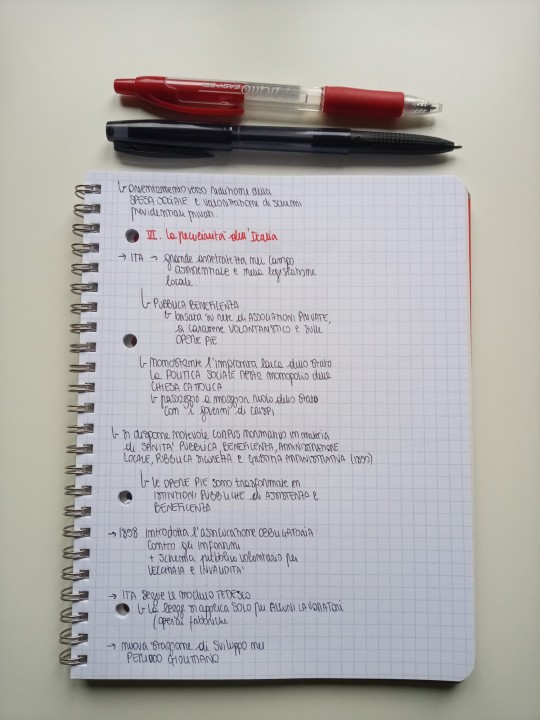
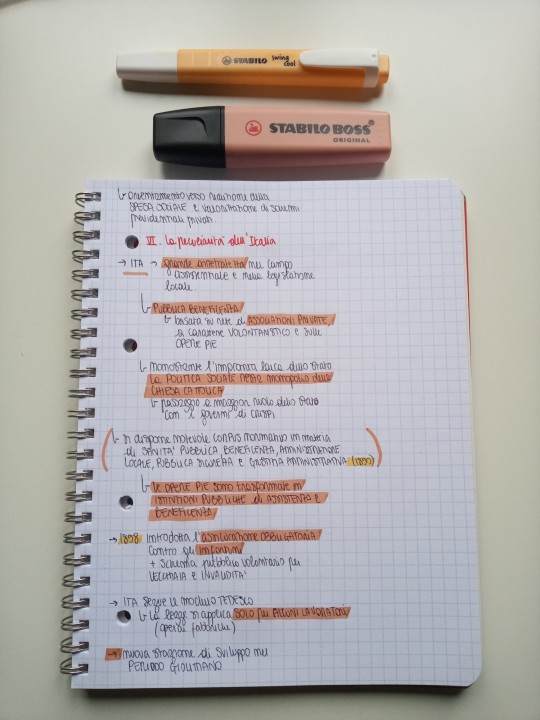
Example of symbols and structure of the notes and the way I highlight things (in which you'll hopefully be able to understand my handwriting, and in which there might be some spelling errors but alas that often happens in my real notes as well so if there are any it's for the sake of accuracy lmao). If I end up adding informations on the margins I always use a pen of a different color so I can tell which informations I got from what source (ex. main notes from lecture, colorful notes from additional article).
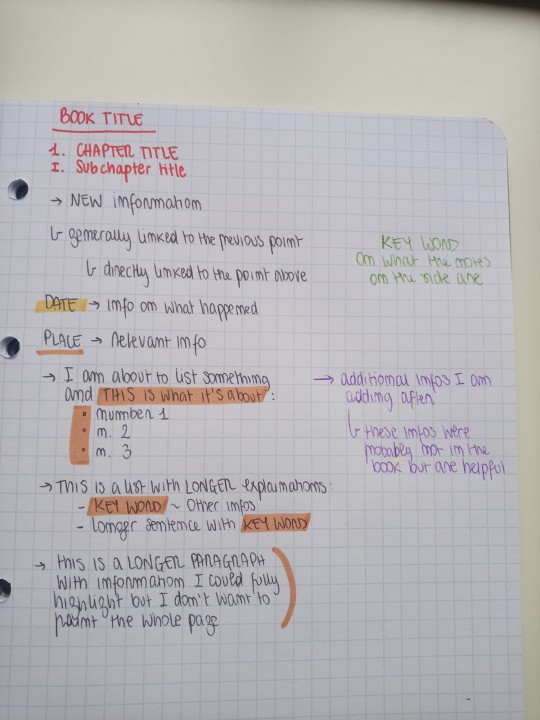
Example of messier notes in which the main text in black are the notes I took during lectures and the additional colorful text was added while writing the materials (I rarely do this, it usually happens when the lectures follow a book precisely, which happens when we have to study books or summaries written by the professor). As you can see I often use post it notes to add more writing space, and sometime I even use them to create visually separated sections. If I end up adding some drawings I also usually like to have them on post it notes so they stand out more (and if you are wondering why the hell would an history student need drawings it's usually either because I need a map or a region/state to mark things out, or when studying for archaeology exams I often needed visual references, for example to identify different types of vases or decorations).
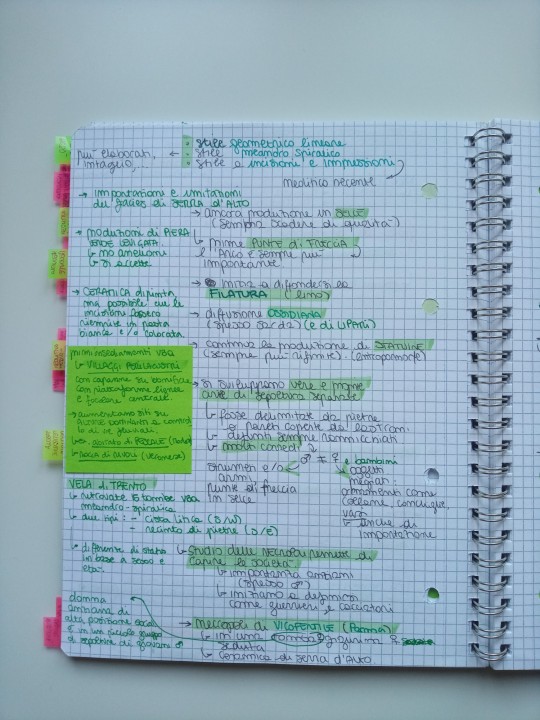
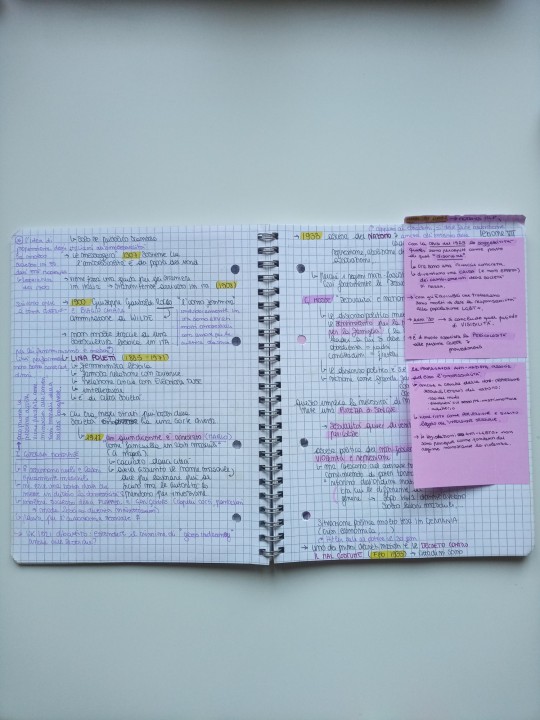
#this should be it#i was hoping on a more structured post but it was harder than i expected to write#both because so much of note writing is now a brainless activity for me and also bc it's really not easy to exaplain certain aspects#like the symbols i use#i really did my best and hope it will be useful#then again if y'all have questions the inbox is open and i will try my best to answer whatever your heart desires#studyblr#studyinspo#studying#study tips#study advice#note taking#hadwritten notes#my note taking method#how to take notes#non fiction books#academia#uniblr#university#booklr#study method#mine#the---hermit
237 notes
·
View notes
Text




Day 133 😙
2025.1.11
#daily blog#daily#studyblr#studyspiration#study motivation#studywithme#study space#desksetup#studystudystudy#study notes#study snack#study studying studygram studyblr studyabroad studyhard studyspo studymotivation studytime studyinspiration studyinspo studyaccount studybl#studyspo#study schedule#study study study#study session#study studyblr#studyblr community#studygram#study goals#study girl#uniblr#university#study environment#study diary#study day#study material#study method#study guides
169 notes
·
View notes
Text
these methods are what are helping me the most to learn spanish:
1. Label Your Household Items: Place labels with Spanish names on objects around your home. This constant exposure helps reinforce vocabulary in a practical context.
2. Create a “Spanish Only” Zone: Designate a specific area or time each day where you only use Spanish. This could be a room or a period during which you read, watch TV, or speak only in Spanish.
3. Use a Spaced Repetition System (SRS) for Vocabulary: Instead of traditional flashcards, use an SRS app to review words and phrases at increasing intervals. This method helps improve long-term retention of vocabulary.
4. Write a Diary in Spanish: Keep a daily journal in Spanish. This practice helps you think in the language and improve writing skills while reflecting on your day.
5. Sing Along with Spanish Music: Choose songs in Spanish and sing along, paying attention to the lyrics. This helps with pronunciation, rhythm, and understanding colloquial expressions.
6. Learn Through Role-Playing: Act out scenarios in Spanish, such as ordering food in a restaurant or asking for directions. This method helps you practice practical language use in a fun and interactive way.
Important: Methods can change depending on what works for you, so try everything you can. Methods can also turn out to be less effective as you gain more knowledge.
obs: Spanish is my priority right now because I’m no longer learning it as a hobby but as a necessity. You are free to correct me.
#spnotesbyvi#study notes#langblr#studyblr#study motivation#study method#learning spanish#spanish language#spanish studyblr#study blog#learn spanish#espanol#espanhol#español#🇲🇽#🇪🇸#correct me if i'm wrong
145 notes
·
View notes
Text
Understanding study material 📚 Effective strategies 🤔
Here are some research-backed tips to help you navigate difficulties in understanding study material effectively 💪🏼
1️⃣ Break down complex concepts
Research suggests that breaking down complex concepts into smaller, more digestible parts can aid in understanding. Divide the material into manageable sections and focus on understanding each component before moving on to the next.
2️⃣ Engage in active learning
Active learning techniques, such as summarizing, teaching others, and practicing with flashcards, can improve understanding and retention. Engage actively with the material by explaining it to a study partner or testing yourself with practice questions.
3️⃣ Seek clarification
Don't hesitate to seek clarification from your instructors, peers, or online resources when you encounter difficulties. Research indicates that asking questions and seeking feedback can enhance understanding and fill in knowledge gaps.
4️⃣ Utilize visual aids
Visual aids, such as diagrams, charts, and graphs, can help simplify complex information and improve comprehension. Create visual representations of the material or use existing visual resources to enhance your understanding of challenging concepts.
5️⃣ Connect new material to prior knowledge
Research in cognitive psychology emphasizes the importance of connecting new information to existing knowledge for better understanding. Relate new concepts to familiar ideas or experiences to establish meaningful connections and improve retention.
6️⃣ Practice retrieval techniques
Research studies suggest that practicing retrieval techniques, such as self-testing and quizzing, can strengthen memory and understanding. Test yourself regularly on the material to reinforce learning and identify areas that require further review.
7️⃣ Collaborate with peers
Collaborative learning has been shown to enhance understanding and retention of study material. Engage in group study sessions with peers to discuss challenging concepts, share insights, and benefit from diverse perspectives.
8️⃣ Take breaks and manage stress
Take regular breaks during study sessions, practice relaxation techniques, and prioritize self-care to manage stress levels and optimize your cognitive performance. Read posts about mental and physical health to find more useful information.
#medicine inside#studyblr#study with me#study hard#study time#study desk#desk setup#study notes#studying#study inspiration#study tips#tips to study#medicineinside tips#tips for students#study habits#study method#studyinspo
211 notes
·
View notes
Text
The Nature Method
The nature method textbooks were designed to be read, and if you knew a similar language you were meant to rely on cognates and the pictures to understand the whole textbook. The lessons would gradually introduce new words (around 3000) in context, and new grammar.
I want to share something awesome! A girl tried out the same nature method textbook I did. Her video is short so I recommend just checking it out:
youtube
She also linked the nature method resources in her summary, which I will paste below:
Nature Method books (English, French, Italian, German): https://drive.google.com/drive/folder... Similar books for Spanish (for online viewing): https://archive.org/details/pocopocoe... https://archive.org/details/allspanis... / irish_via_the_nature_method Audio (English, French, German, Italian): @freetongue Shoutout to Free Tongue for providing all this free, quality audio! French Nature Method playlist: • Le Français par la Méthode Nature
I read half of Le Francais par la Methode Nature, years ago, and it helped push me to being able to read graded readers I had and then eventually anything I picked up in French. I loved the book. I loved learning to read BY reading in the language immediately, learning a language BY doing stuff in the language immediately. I love learning through context, so I loved the style of these nature method textbooks and wish there were more modern ones being used. Lingua Latina for Latin is the only nature method textbook I'm sure is still being used in some classes.
I ended up finding print copies of the French version, the Italian version, and a similar styled book called the All Spanish Method.
I used the audio of Le Francais par la Methode Nature made by Ayan Academy on youtube, like her, to work on my listening skills a few years after reading the textbook. I still would like to both finish reading and listening to this textbook. I feel it got me to B1 level and then I just kind of jumped into reading other stuff I was interested in, and my reading skills improved but none of my other skills did lol.
If you like the style of the textbook, I really recommend these nature method textbooks. If you use them, using them the way she describes she studied them in her video is probably the best way. I just read and listened, and it helped my passive skills but I definitely want to go back and do the production exercises one day.
Be aware they're OLD textbooks, 70+ years old at this point, so some information and words may be out of date. I partly read the textbook when I first did because I was curious what differences there were in an older textbook, what things they taught differently, how they spoke about history and values, which is why I have a big collection of old textbooks at home. I'm into looking at that kind of stuff.
(I once had a horrifically bad chinese textbook from right in the middle of the simplification of characters, so some were simplified and some weren't, and the textbook only had a whopping 100 words it taught which really upset me... on the other hand I have an amazing Chinese Grammar textbook from 1930 that uses 了 only ever pronounced as 'liao' and only uses nin for you, but it's grammar and hanzi explanations are some of the clearest I've ever read).
Well the nature method textbooks were used most from 1920s - 1960s, and the older ones are often the Direct Method (mislabeled by someone as Nature Method) which involved a lot of dialogues in the target language but were not necessarily designed to be understandable without a teacher. Nature Method textbooks are designed to be understandable without a teacher, with just the context of the textbook and visuals, and assume the student knows a similar language to the target language already (so it assumes students know Spanish or Italian or French or English or German already).
Nature Method textbooks usually have more context and cognates in the beginning chapters. Direct Method textbooks usually have plenty of dialogues, and sometimes plenty of pictures to teach the words, but ultimately assume a teacher is teaching many words and grammar and so grammar is not explained in the context of long form stories like it is in nature method. I like Nature Method more. Direct method is okay, Poco a Poco is an example of a direct method textbook. Le Francais par la Methode Nature is an example of a nature method textbook.
Anyway I love the nature method textbooks, I wish some newer textbooks were designed in a similar way.
#Youtube#nature method#the nature method#video#study method#study plan#french#french resources#resources#comprehensible input#langblr#I LOVE the nature method textbooks i can't emphasize that enough
36 notes
·
View notes
Text
₊˚⊹ ᰔ stop procrastinating: school edition ᝰ.ᐟ



procrastination caused my own personal burn out with school and it caused so much anxiety about my academics as well. when we get into the habit of doing it now rather than later, we relieve so much stress— more than we actually realize too!
let’s begin !!
ᝰ.ᐟ think about all the stress
while there is a lot of stress when it comes to school, we have to consider how much stress we get when we procrastinate versus the stress we get from school in general. the stress we get just in general can seem like a lot, and it is a lot! but when we procrastinate, we just add onto the stress we already have and creating even bigger feelings about school that might turn into something that isn’t so easily manageable.
you might feel stress from…
the number of classes you’re taking
the difficulty level of certain classes
how much homework or studying you have to do
procrastination adds the stress of…
meeting due dates/deadlines
cramming an entire unit’s worth of material the night before an exam
a large pile of work you still have to do when all your due dates are on the same day
losing very much needed sleep to try and get everything done
the possibility of turning in work that might not be your best and earning a failing grade
the possibility of losing silly points due to simple mistakes because you didn’t have an ample amount of time to study
the risk of turning in late work and losing points
not being able to balance your personal life with your academic career, risking burn out
notice how procrastination stress can come in a variety of forms? adding on that kind of stress on top of stress you might already be feeling will only continue to weigh you down, and the goal is to relieve that stress, not make it worse.
you have to consider the fact that procrastinating can only worsen your stress. “but i work best under pressure!” no, babe. you think you work better under pressure because you’ve got all this adrenaline rushing through you to get everything done, and exerting that much energy will only burn you out!
ᝰ.ᐟ how to stop procrastinating
use a planner
i’ve talked about the use of planners in a previous post, but i’m bringing them up again because they seriously are that useful when it comes to stopping that procrastination habit!
you’ll be able to plan out your day or even your entire week and get a look ahead for what’s to come. you can review your daily/weekly plans and start by setting aside a designated time frame for school-related work.
let’s say it’s a tuesday and you have the day off from work but you have a doctor’s appointment at 12pm and then you have to run errands that might take about 1-2 hours, so you’ll be out of your house between 11:30am to 2-2:30pm. but let’s also add in that you have a dinner with a friend around 6pm. set aside time from 3pm to 5pm to do homework or to study! when you review your plans for the day, you have to find time where you might have some downtime and use it towards schoolwork! wherever you have some downtime throughout your day/week, use that time to get to work!
prioritize tasks
create a check list from the most important to the least important! you can do this before you sit down and get to work or when you’re planning out your day/week. check due dates for assignments and see which ones need to be completed first and which ones you still have time for. make note of exam/quiz days and if you have a quiz for one class next week but a big exam the week after, prioritize the quiz for next week.
also when you do create your little check lists, work in sections! review all of your classes and see which ones take priority and which ones can wait. of course, it’s important to prioritize all of your classes as they’re all equally important, but when you plan out your day/week and you compile a checklist for every single one of your classes and assignments you can really quickly overwhelm yourself!
eat the frog method
i’ve seen this method be talked about a lot! if you’re unfamiliar with it, it’s basically (in really simple terms) doing the most difficult task first and working from there, leaving your least difficult task last!
this method helps to alleviate so much stress off your shoulders! getting the hardest assignment/task out of the way will make doing the rest of your work a breeze! and, once you get that most difficult task done, you don’t have to stress about it anymore!
remove any and all distractions
i mentioned this in a previous post as well, but if you have an iphone or any other apple product, you can create different focus modes that you can customize for different things! i’ve personally created a “study session” focus mode that i customized to only show homescreen pages that won’t cause a distraction and i’ve also set it so that i don’t receive any notifications. if you are able to do that, do it!
if you don’t have an iphone or don’t have a “do not disturb” feature, then simply silence your phone and keep it away from you. if you’re at home studying, maybe place your phone on the opposite side of the room or even put it in a completely different room. if you’re out at the library or any other place where you might study, tuck your phone into your bag.
get noise cancelling headphones! or work in a relatively quiet area! outside noises, whether it be noise from your family or noise from other people in a café or even noises like construction work outside, can cause a lot of distractions. your work/study environment should allow you to fully focus on what tasks you’re completing and different sounds/noises can lead to you losing your focus.
remember to take breaks
when you set aside time to do school work or study, you might feel the need to get it all done in one sitting. doing so can cause burn out, so you need to remember to take breaks!
especially when studying, i’d implement the pomodoro method (25min of work - 5min break, 50min of work - 10min break). of course you can use this method while doing homework as well!
i cannot stress this enough: take breaks. please! don’t overwork yourself. your mind seriously needs to rest from time to time.
change your mindset
how you think of school and the assignments/work that comes with it plays a huge role in your productivity level. if you consistently have that mindset of “i’ll do it later” or “i’ll do it when i have more time” you’ll quickly see the days go by and then suddenly deadlines are a day away or your big exam is the next morning!
if you can do it now, then do it! i mentioned earlier to work on schoolwork whenever you have downtime, and i mean it! your time is precious and it should be spent getting work done and accomplishing goals!
i also say over and over again that taking breaks is essential, but with this and making sure you get things done right when you have the time to do it, there needs to be a balance. you have to balance your personal time and productivity time because procrastinating on your own well-being is just as stressful as procrastinating on your academics.
ᝰ.ᐟ final notes
i’ve fallen victim to procrastination, trust me when i say that! it’s a hard habit to break, especially when we don’t realize we have that habit! but it’s all about finding a balance between school and your personal life (and work if that applies to you!). when you give more of your energy towards one over the other, you lose potential good energy that could go into the other. you are your own priority, and i will always stand by that, but i know a lot of us value our education so we have to make sure that is also in our list of priorities. we all wish to succeed and starting off our success within our classes is the first step to achieving those bigger long-term goals!
with lots of love, juno 🌷
#milkoomis#girlblogger#girlblogging#it girl#that girl#girl blog aesthetic#studyblr#study movitation#study method#study blog#study tips#study time#study tumblr#school motivation#motivation#productivity#productivityboost#productivitytips#study productivity#pink academia#light academia#academics#academia aesthetic#academia#self improvement tips#self improvement#leveling up#level up#level up tips#becoming her
420 notes
·
View notes
Text
GIRL DINNER.




#studyblr#study blog#study aesthetic#study motivation#premed#student#student life#study notes#study desk#academic validation#study space#study hard#study studying studygram studyblr studyabroad studyhard studyspo studymotivation studytime studyinspiration studyinspo studyaccount studyblo#study method#study tips#studying#medicine inside
302 notes
·
View notes
Text
My Study Method
I have quickly mentioned my study method in several posts through the years but I don't think I have ever written a proper post about it, so here it is.
I have to say that overall my study method is quite time consuming, but in years of experience it's what works best for the type of learner I am, the materials I have to study and the type of exams I have. I believe these three elements are the fundamental things you should figure out when creating your own study method. Let's go over these things quickly. Firstly I am an history student, tho not all my exams are history based (I have taken some language, philosophy, anthropology and litterature classes) so my method is proofed for most humanities. I am a learner with terrible memory, if you give me a list of things to learn by heart expect me to fail because my brain simply cannot do that. So I have to train myself to learn things when studying for an exam. As for the type of matherials I have to work with when studying for an exam, they are mostly full non fiction books, sometimes I have to work on articles as well, and depending on the class I have lectures to attend.
The fundamental element of my study method are the notes I write. That's why in my daily posts I am constatly mentioning them. The lectures I attend are turned into notes, the books and articles I have to read are turned into notes, everything you leave me with for too long will be turned into notes. The very act of writing is what truly helps me get into the topic, understand it, and memorize it. I might write an indepth post on how I write notes in the future, but for now what you must know is that the goal of my notes is to be the only material I actually study in the end. As I mentioned the very act of writing is itself a huge part of my study process. When I am listening to a lecture I try to write down notes as tidy as possible, and then try to fix them at home if needed. So there's not much to say there, as for the materials I have to read here's how I do it. When I get a book I have to study I usually read a chapter and underline all the important bits that I will be transferring to my notes as I am reading. When I am done with the chapter and have the topic still fresh in mind I write down by hand all my notes. The goal is to write everything I need to know, in a direct and easy way using my own words. By re-elaborating the original text I am making sure I am not blindly copying things, and actually understanding stuff. Once the entire book has gone through this process, the book goes back on the shelf and as I said I only work on my notes from then one.
Once I have all my notes ready a long time has probably passed, but in reading and writing I have already started to memorize things in general. I try to highlight my notes as I am writing, but in case I don't I go back once I am done writing, doing a quick reread and highlighting important stuff. I usually use two different colours: yellow for the important dates and another colour for the other informations. At this point there's two more steps left. Repeating and writing key words.
If writing notes can be counted as half of my studying, repeating outloud is the second half. Since I have oral exams I have to make sure I am comfortable with exaplaining things, showing I have understood things and I am not just midlessly reciting a list, and using the right terms. I am a very lucky person because my dad is both retired and quite interested in the topics that I study, which means that I get a lot of help from him in this phase of studying, because basically what I do is following him around the house for a few days exaplaining my notes to him. If you do not have someone to annoy with your study, talking to yourself works too but you have to speak outloud and honestly pretend you are giving a lecture. If you just go over your notes and read them it is not the same thing, it's way less effective. I usually do two rounds of repeating. The first one looks a lot more like reading and saying things outloud in my own words. By the second one I am usually much more comfortable with informations so I have my notes there only to guide me through topics making sure I don't miss anything. Having someone who actively listents to you is definitely a bonus because if they ask you questions they challenge you in the exact same way an oral exam does, and you make sure your exaplainations are as clear as possible.
The very last step is going through my notes one last time with the goal of writing a long list of key words. This is a tool I specifically use to review things quickly the day of the exam. Usually during my commute I reread the list of words in my head and I mentally make sure I remember about everything.
As mentioned this is a longer study method but it truly locks things in your brain, and paying that much attention to note writing also makes them a tool that lasts in time. If I am interested in the informations of any of the books I read during my degree I can pick the notebook in which I wrote those notes and find the information right away without even having to open the actual book. I usually dedicate a whole notebook to each book, in order to archive and find them easily. I will be writing a specific post on the way I write notes, maybe including a few pictures, but in the meantime I hope this was somewhat helpful.
#kids i have written this the other day and rereading once so there is surely typos and not perfect sentences but i think it does the job#i am thinking of making one more post on how i write my notes since they are so important to me and then maybe writing a post on oral exams#do let me know if something isn't clear or it you have questions!#when i was still working on creating a stuy method i found posts like these quite useful so hopefully this will be helpful for someone#studyblr#studyinspo#study tips#study method#uniblr#university#historyblr#studying#student life#study motivation#study blog#study advice#mine#the---hermit
144 notes
·
View notes
Text




Day 75 🍍
2025.5.17
#daily blog#daily#studyblr#studyspiration#study motivation#studywithme#study space#desksetup#studystudystudy#study notes#study studying studygram studyblr studyabroad studyhard studyspo studymotivation studytime studyinspiration studyinspo studyaccount studybl#study english#study hard#studygram#study group#study goals#uniblr#university#study studyblr#studyblr community#study blr#studybrl#study burnout#study method#study#study with inspo#study environment#study with me#study girl
78 notes
·
View notes
Text

The ultimate family tree guide (or how to call every single member of your family) by everpresent!
#study blog#studyblr#langblr#study motivation#study notes#langblog#language#study time#english langblr#practicing english#learn english#english#languages#study advice#study inspiration#study method#study tips#studies#engnotesbyvi
43 notes
·
View notes
Text
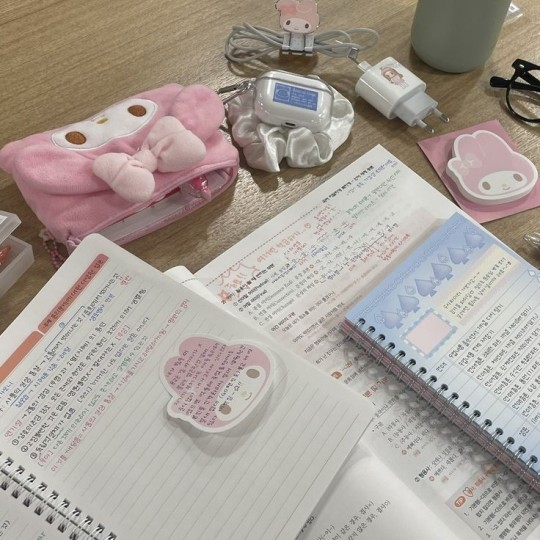
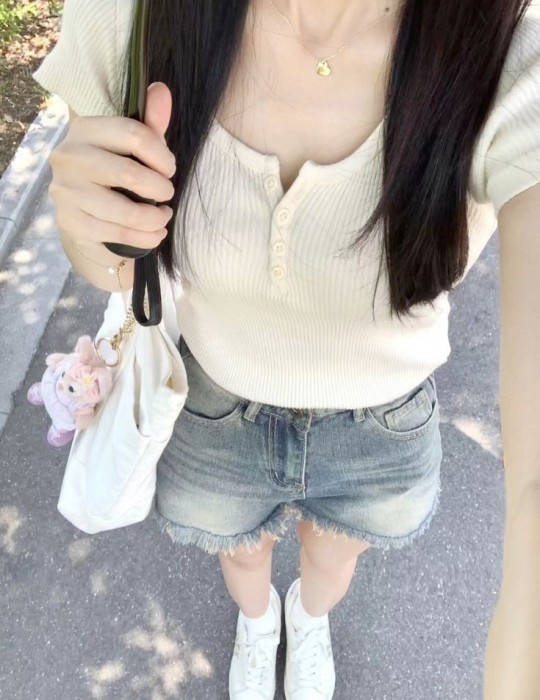

studying methods ˖ ⊹ ࣪ ౨ৎ˚
"the kpop method"
You're going to pretend that your school is a kpop company, and each class represents a different kpop group, and each student is a member of that group. The best student in each class is the most biased member, and the worst student is the least biased member. work until you are the most biased member. By working hard and putting in your effort, you can become the most biased member of your class and achieve your academic goals.
BONUS - If you want to become the best version of yourself while still using the kpop method, i have a little tip for you! You're going to make a list of requirements for yourself, this can include how you want to dress, how you want to act, make a routine for yourself, etc. Then you can pretend it's your "company" telling these things, as if you were a real kpop idol ˖ ᡣ𐭩 ⊹ ࣪
(this method is not mine, credits to the original owner of this method)
" The Rory Gilmore method"
this method is not very complex, but it has a lot of steps.
1. create a schedule - Rory is well-known for her strict schedule and commitment to sticking to it. To study like Rory, you should first make a timetable outlining your study time, your reading time, and free time. Include breaks in your schedule and try to follow it as much as you can.
2. lots of reading - Rory is an avid reader who always carries a book with her. Pick books that interest you and make reading a daily habit ( i recommend reading before bed because it helps me to calm down and helps me with falling asleep). Reading books will help you develop your vocabulary and critical thinking skills.
3. Take notes - Rory is well-known for her detailed notes and ability to retain new information. Take notes in class and annotate your books. Make your notes more structured by using highlithers and different colors, and review them daily. (goodnotes - ios, notion - ios and android are great for digital notes)
4. Make use of flashcards - Rory memorises stuff through flashcards. Flashcards can be used for vocabulary terms, key concepts, and other relevant information. Use them to test yourself and review regularly.
5. Define your goals - Rory has a set goal, what are you working for? Make a vision board, write down your goals, visualize. This will help you stay motivated and not loose focus!
6. stay organized - Rory is well-organized, and her study space is always neat and tidy. Keep your study area nice and free from distractions. Use folders, binders, and other tools to keep your notes and supplies organized, make sure your work space is clean and clutter-free.
7. seek help when needed - Rory is not afraid to ask for help when she needs it. Don't hesitate to ask for help from your teachers, tutors, or classmates if you need it. To enhance your learning, ask questions, and seek out extra resources such as textbooks, youtube videos, and study guides.
8. atmosphere - Don't forget to make the atmosphere cozy, light a candle, prepare yourself a cup of tea or coffee, and wear a comfy sweater. Create an environment in which you can stay focused for hours! ˖ ᡣ𐭩 ⊹ ࣪
(this method is not mine, credits to the original owner of this method)
Yujin is logging off...
#study#studying#school#tips#methods#study method#rorygilmore#kpop#wonyoungism#motivation#girlblogging#aesthetic#popular#viral#viralpost#studytips#sanrio#pink#pink blog#studentlife#schoollife#notes#productivity#productivitytips#goals#organizing#flashcards#learning#reading#schedule
107 notes
·
View notes
Text
How to study during bad days 🙇🏻♀️
We all have those days when studying feels impossible. But science-backed strategies can help you stay on track even when motivation is low!
🧠 1. Use the “5-Minute Rule”
Research shows that getting started is often the hardest part. Tell yourself you’ll study for just 5 minutes—chances are, you’ll keep going!
🛋️ 2. Change Your Study Environment
Your brain associates places with tasks. If you’re feeling stuck, try moving to a different room, a café, or even just switching seats.
🎶 3. Listen to Binaural Beats
Studies suggest that binaural beats (frequencies like 40Hz) can improve focus and reduce stress. Classical or Lo-Fi music can also help!
🌿 4. Try Aromatherapy
Scents like rosemary and peppermint have been proven to enhance memory and concentration. Diffuse essential oils or keep a scented sachet nearby.
💡 5. Use the “Energy Matching” Technique
🔹 Low-energy? Do passive tasks like reading or watching study videos.
🔹 High-energy? Tackle active tasks like problem-solving or note-making.
☀️ 6. Get Natural Light Exposure
Sunlight boosts serotonin and helps regulate your body’s natural clock, keeping you alert. If you’re indoors, sit near a window or use a daylight lamp.
🫂 7. Body Doubling for Motivation
Studying with someone (even virtually!) increases accountability. Try joining an online study session or using apps like StudyStream.
🍫 8. Eat Brain-Boosting Snacks
Dark chocolate, nuts, and berries can enhance cognitive function and sustain energy levels. Avoid heavy meals that might make you sluggish.
❤️ 9. Be Kind to Yourself
On tough days, lower your expectations. Even a little progress is better than none. Focus on consistency over perfection.
🔄 10. Use the “Looping Method” for Retention
Revisiting the same topic multiple times in short bursts strengthens memory—this is called spaced repetition and is backed by neuroscience!
💬 Which of these tips do you use on bad days? Let’s help each other out!
#medicine inside#studyblr#study with me#study hard#study time#study movitation#study tips#study habits#study session#study method#mental health support#student help
46 notes
·
View notes
Text
Master Post
(will get updated as we post, doesnt include reblogs nor memes/shitposts/today is)
Intro Post
Study Techniques
Highlighting, Highlighting better remake
Feynman
Blurting
PQ4R
How to: Oral Presentations
Visual Aids for Presentations
Flashcards
General Study Tips
Backpack Basics
How to Not Feel Bad about Bad Grades
Multiple Tests at once
Tips for focusing
1, 2, 3, 4, 5, 6, 7, 8, 9, 10, 11, 12, 13, 14, 15, 16, 17, 18, 19, 20, 21, 22, 23, 24, 25, 26
Reminder #1, #2, #3, #4, #5, #6, #7, #8
Study Asks
Motivation to start, pt2
Selfcare/Study Balance
Reducing Screen Time (see the section Others for the better update)
Motivation in general
Rewards
Burn Out
Boring Lit Books
Polls
Study Music
Pomodoro
Academia
Deadlines
Notion
Study Drinks
HS/Uni
Separate Blogs
About Us
10 things about us
Jay's study method (100 notes in that post and ben will be forced to do his part)
Long term goals
Study methods Jay doesnt like
Others
Study Playlists
how do i study graphs aaaaaaaa
Keep Arg Universities Open
?²
Self-Care
Toxic productivity & academic validation
Reducing Screen Time
Asks are always open!
#study motivation#studyblr#study#study aesthetic#study blog#studyspo#study-core-101#student#study community#studyinspo#studyblr community#studying#study tips#studying tips#study method#study techniques#masterlist#masterpost#students#study time#studying inspo#study inspiration
174 notes
·
View notes
Text
how to make finals your bitch. ᥫ᭡
- be at your best to give it your best -
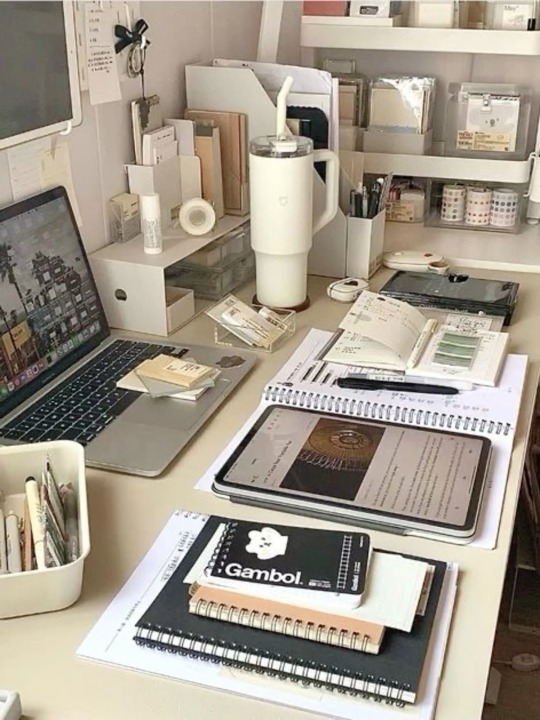
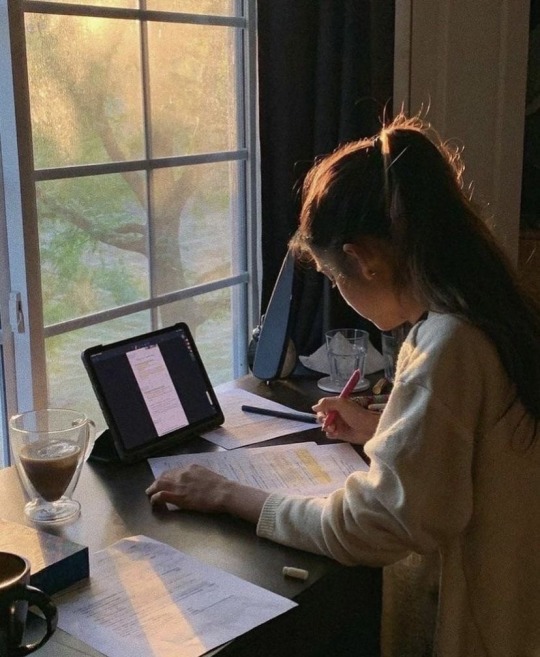
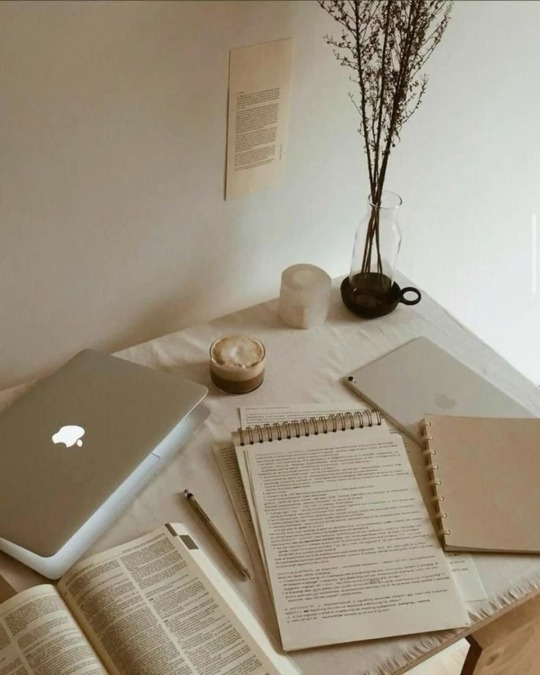
hello angels! so it’s been almost 2 months since i’ve been active on here & it’s simply just been due to me focusing a lot of my time and energy into my academics, career, & personal life! i’m nearing the end of my program with my externship just being one month away! as with a lot of us, the spring semester is slowly but surely coming to an end! and that means finals are just around the corner! i wanted my “comeback” to be some of my helpful tips, tricks, & tidbits of advice for getting through finals and making sure you pass with flying colors!
also, thank you so so much for 1.2k!! i didn’t expect to gain such an influx of followers while i was gone! it means so much to me that so many of you have supported my blog even during my inactivity/unexpected hiatus! i can’t promise i’ll be coming back completely as i have my externship coming up, so i’ll be very busy the next few months! but i hope to continue to post every now and again for you angels!

let’s begin …
୨ৎ — pre-finals prep
it’s important to start prepping for finals in advance! finals may be 4-5 weeks away, but it never hurts to get a head start in your preparations!
create a checklist! — you can always start by making yourself a list or two for everything you need to get yourself prepared for that intimidating finals week! these lists could be a list of different study materials you’ll need, a list in order of priority of the different classes you need to study for, a list of supplies you’ll need to get yourself through the week (& yes, this can include snacks or any self-care stuff!), or even a list of different topics from your classes that you feel need a bit more of your attention! checklists are an amazing tool to use to keep yourself organized and can help you visual what needs to get done or what needs to be obtained!
plan out the weeks! — designate a day in your week where you take some time to plan out your weeks prior to finals week and the week of! include time blocks where you set aside time to study and time to take breaks and rest your mind & body! add small, achievable to-do lists for each day or a bigger, more broad one for each week! weekly planning can give you a tangible idea of what your weeks leading up to finals and the week of will look like, so don’t hesitate to give it a try or incorporate that into your weekly routine!
tina’s tip: utilize your phone’s calendar app! i do almost everything digitally and i’ve been making great use of the Apple calendar to plan out my weeks! it’s a great way to color code different events, classes, appointments, assignments, etc. & if you’re also someone who wants to get into digital planning it’s a great first step into getting into it!
prioritize & maintain good health! — i’m saying this with love, but pulling all-nighter’s every single day leading up to finals is not going to guarantee the best scores for you. you need to make sure your health is where it needs to be! sleep is absolutely vital to making sure your mind and body is working at its very best. as someone who used to be an insomniac and who used to religiously pull all-nighter’s for school, i’m telling you it is not worth it. i didn’t see any improvement in my grades when i was doing that. if anything, my scores and my motivation for school got worse. you can’t just go all night racking your brain over your studies. prioritize your health! this also means making sure you fuel your brain and body with good nutrients! when i’m only running on caffeine, not only do i feel physically weak, but my mind is using so much more energy on becoming anxious than staying focused.
tina’s tip: make sure you set aside time at least once or twice a week to something that makes you happy, helps you relax, and is not related to your academics! i have a rule for myself that after 7:30pm-8pm every single night that i immediately stop working on anything related to my studies so that i can truly unwind for the night. i’ll use my time before bed to have a self-pamper night, play video games, watch a show/movie/youtube video, draw, read, or chat with a friend on facetime! it’s important to include things that bring you joy into your routine! don’t burn yourself out by only focusing on your studies!
୨ৎ — the study wave
try to give yourself at least two weeks in advance to study for finals. consider these two weeks as the study wave! this is the perfect time to really lock into those time-blocks you’ve set aside for your study sessions. each day should be filled with review & ensuring you fully understand the material! the time-blocks could be as long as 5 hours or as short as 30 minutes. i recommend the start of the study wave to include longer study time-blocks and as you get closer to the week of finals to shorten those time-blocks!
week 1 of study wave — reteaching yourself the material: rewatch lectures, review powerpoints/videos/notes/previous homework assignments, and incorporate study methods like the feynman technique, practice tests, & active recall! use this time to form study groups, don’t hesitate to have longer study sessions (remember to take breaks!), and refresh your mind of everything you need to know for upcoming exams! let week 1 help you decide what material/topics/chapters/classes need more of your time and attention and which ones don’t!
tina’s tip: dedicate certain days out of the week to 1-2 classes! this will help to prevent any overwhelming feelings of stress, anxiety, and/or burn-out as you prepare for finals! prioritize which class(es) need the most review, maybe a couple classes need more than one designated study/review day and maybe other classes just need one day throughout the week!
week 2 of study wave — refresh & review: utilize study methods like the blurting method, flashcards, practice tests, & other forms of active recall! this is prime time to focus on active recall methods. doing so will help make sure the information stays fresh in your mind and will help you refine that mental list of which classes/topics still need a little more attention! week 2 of the study wave should included shorter study sessions whether it’s 1 or 2 hours shorter than week 1 or even as short as setting aside 20 minutes every day reviewing material. take this time to try and focus more on those more challenging topics rather than reviewing every single bit of information!
tina’s tip: if you use the blurting method, i recommend using it towards the end of your study sessions! this allows you to recall information as well as put it into your own words that will show whether or not you comprehend the material. review what you’ve written down based off of memory and identify any missing points or errors in your work! this will also help you refine what bits of information still need more focus! repeat this method 3 times!
i highly encourage you guys to also use this time to meet with professors/instructors to ask any additional questions! you’d be surprised at how much of a difference it makes to ask those pressing questions on different parts of the material!
୨ৎ — finals week
it’s extremely important that you are getting enough rest the week of finals! it all sounds cliché, but making sure you’re well-rested and you’ve filled your body with the right nutrients can make such a crucial difference in your exam performance!
if you have time in-between different exams, use that time to do quick review sessions to prepare for your next exam!
avoid cramming! — these in-between study sessions should be used wisely and in an effective manner. take some time to focus on material that has been challenging for you and don’t worry too much about reviewing parts that you’re already confident with!
keep the review short! — if you have 30 minutes or even a couple hours before your next final, do not use the entire time of your “break” to study/review! give your mind a break to rest! listen to some music, play a cozy game, or even take a quick nap if you’re able to! a lot of your mental energy should be put into your time taking the exam, so don’t expend all that energy into studying/reviewing!
final notes —
finals can be exhausting, anxiety-inducing, and just an overall challenge. since it’s that time of the semester where, i’m sure, most of us are starting to experience a drop in the level of our academic motivation, it’s really important to maintain a good and reliable study/school routine to keep yourself on the track you ideally want to be on!
i stress this a lot in my other posts, but self-care is extremely important in being able to maintain good routines in your day to day life! so be sure you’re still incorporating time to focus on your self care to keep yourself afloat!
with lots of love, faustina 🌷
#milkoomis#studyblr#study tumblr#study blog#study tips#study method#study#studyspo#study motivation#romanticizing school#school motivation#academic motivation#academia#soft academia#dark academia#studying#college life#college
264 notes
·
View notes